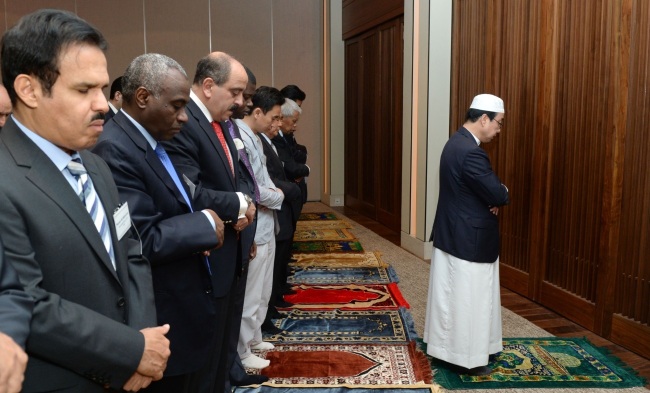Envoys from Islamic countries break fast with MOFA
By Korea HeraldPublished : July 13, 2014 - 20:05
The Ministry of Foreign Affairs hosted Muslim and Arab envoys and other VIPs in an iftar dinner reception at a hotel in Seoul on Wednesday.
Iftar, literally “breaking the fast” in Arabic, is a meal eaten by Muslims to break their fast after sunset every day during the holy month of Ramadan, which continues until July 28 this year.
“Tonight, as we begin the first of the next 10 years of iftar dinners, I am happy to welcome the largest number of guests ever,” said Foreign Minister Yun Byung-se.
Iftar, literally “breaking the fast” in Arabic, is a meal eaten by Muslims to break their fast after sunset every day during the holy month of Ramadan, which continues until July 28 this year.
“Tonight, as we begin the first of the next 10 years of iftar dinners, I am happy to welcome the largest number of guests ever,” said Foreign Minister Yun Byung-se.

Starting in 2004 with a small gathering of 20 members of the Islamic diplomatic corps in Seoul, the Foreign Ministry’s iftar dinners have become a decade-long tradition.
This year, some 100 guests came together for the Foreign Ministry-organized iftar meal, representing the diplomatic missions of 29 Islamic countries, as well as 40 organizations related to the Muslim community in Korea.
There are an estimated 140,000 people of the Muslim faith residing in South Korea.
In addition to South Korea, foreign ministries of other nations also host such a gathering. The United States Department of State has hosted an annual iftar dinner since 1996 for local and national community leaders and faith groups as well as foreign policy officials.
At Wednesday’s iftar dinner, Yun said that South Korea is working to extend its relations with the Middle East and the Muslim world beyond oil and gas imports.
In September 2013, the Foreign Ministry established a “regular dialogue channel” with the Gulf Cooperation Council and the League of Arab Nations, he said.
South Korea last year also initiated a project for the restoration of the Ciliwung River where it passes through the Istiqlal Mosque in Jakarta, the largest mosque in Southeast Asia. The government extended $9 million in grants to finance the project in Ciliwung, while Indonesia contributed $1 million. The Ciliwung River is one of the largest river systems in Indonesia, flowing along a 100-kilometer narrow corridor from the Tugu Puncak in the mountains near Bogor Province, through the congested capital city of Jakarta, and into the Jakarta Bay. It is also one of the world’s most polluted.
“Last year, I laid out my vision to strengthen the relationship between Korea and the Middle East, a vision that I characterized as ‘a comprehensive partnership toward a New Horizon,’” Kim said. “In line with this vision, I would like to take this opportunity to emphasize the importance of revitalizing relations between Korea and the Muslim world.”
In May, President Park Geun-hye visited the United Arab Emirates. Following that trip, the Foreign Ministry is initiating a group aimed at deepening the public’s understanding of the Middle East and Islam.
By Philip Iglauer (ephilip2014@heraldcorp.com)
-
Articles by Korea Herald





![[Herald Interview] 'Amid aging population, Korea to invite more young professionals from overseas'](http://res.heraldm.com/phpwas/restmb_idxmake.php?idx=644&simg=/content/image/2024/04/24/20240424050844_0.jpg&u=20240424200058)












![[KH Explains] Korean shipbuilding stocks rally: Real growth or bubble?](http://res.heraldm.com/phpwas/restmb_idxmake.php?idx=652&simg=/content/image/2024/04/25/20240425050656_0.jpg&u=)

